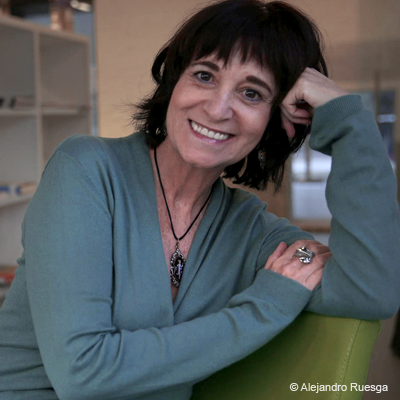BIOGRAPHY
US
Rosa Montero was born in Madrid (Spain).
In 1975 she graduated with a degree in journalism from the Official School of Journalism in Madrid. She also studied psychology at the Complutense University of Madrid (1969-1972).
She worked with independent theater groups such as Tábano, and in 1970 participated in their renowned production, Castañuela 70.
Since 1970 she has worked as a television, newspaper, and magazine journalist. Since 1977 she has worked in exclusivity for El País, Spain's best-selling newspaper, and she served as the editor-in-chief of its Sunday magazine from 1980-1981.
Her journalism appears regularly in various Latin American newspapers, such as Clarín (Argentina) and El Mercurio (Chile). Her articles have also appeared abroad in publications such as Stern (Germany), Libération (France), La Montagne (France), and The Guardian (United Kingdom).
Throughout her career she has conducted more than 2000 interviews, and her interview technique is studied in journalism schools throughout the Spanish-speaking world. Some of her more notable interview subjects include Ayatollah Khomeini, Yassir Arafat, Indira Gandhi, Richard Nixon, Julio Cortázar, and Malala Yousafzi.
Her articles have been taught in Spain's secondary schools for decades, and they appear on university entrance exams. They are also taught outside of Spain, and in 2012 she was awarded a prize for the use of her work in Spanish language instruction in France.
She has been a visiting professor in the United States at both Wellesley College (Boston), and the University of Virginia. She has taught creative writing workshops at Brigham Young University (Utah) and Miami Dade College (Florida). She also has received a grant to lecture at Queen's University Belfast (United Kingdom). She has taught literature and journalism at Madrid's Contemporary School of Humanities and at the School of Letters of Madrid. She has been the commencement speaker at various universities, including the Complutense University of Madrid, the University Carlos III, and the University of Salamanca. She has participated in hundreds of symposiums and conferences all over the world, including the book festivals of Guadalajara (Mexico) and Frankfurt (Germany) and events at many universities, including Harvard and Cornell (USA), Heidelberg and Göttingen (Germany), Venice (Italy), Pau (France), and Minya (Egypt).
She was screenwriter for the television series Media Naranja, which won the Martín Fierro Award for the best foreign production in Argentina in 1988. She also worked as co-screenwriter, host, and interviewer for the 2015 Argentine documentary series Dictadoras (Dictators).
Among the awards she has won for her journalism are the World Interview Prize (1978), the National Prize for Literary Journalism (1980), and the Press Association of Madrid Award for career achievement (2005).
She has published the following novels:
- Crónica del desamor (1979)
- La función Delta (1981)
- Te trataré como a una reina (1983)
- Amado Amo (1988)
- Temblor (1990)
- Bella y Oscura (1993)
- La hija del caníbal (1997)–Primavera Novel Prize, 1997; Critics' Circle of Chile Award, 1997
- El corazón del Tártaro (2001)
- La Loca de la casa (2003)–Qué Leer Prize for best book of the year, 2004; Grinzane Cavour Award for best foreign language book published in Italy, 2005; Roman Primeur Prize (Saint-Emilion, France), 2006
- Historia del rey transparente (2005)–Qué Leer Prize for best book of the year, 2005; Mandarache Award, 2007
- Instrucciones para salvar el mundo (2008)–Cognac European Literature Festival Readers’ Prize (France), 2011
- Lágrimas en la lluvia (2011)
- Lágrimas en la lluvia (graphic novel, 2011)–Barcelona International Comic Fair Best Comic Award by popular vote, 2011
- La ridícula idea de no volver a verte (2013)–Madrid Critics' Prize, 2014; Plessis-Robinson Library Robinsonnais Book Award (France), 2016
- El peso del corazón (2015)
- La carne (2016)
- Los tiempos del odio (2018)
- La buena suerte (2020)
- El peligro de estar cuerda (2022)
- La desconocida, short novel written with Olivier Truc (2023)
She has also published the story collection Amantes y enemigos (Critics' Circle of Chile Award, 1999); the biography collections Historias de mujeres and Pasiones; childrens' books and compilations of interviews and articles; her last one published beeing Cuentos verdaderos (2024).
Her novels have been adapted into various art forms, including theatrical works, short films, a feature film, an opera, and art installations, both in Spain as well as throughout Europe and the Americas.
Rosa Montero's work has made an enormous impact on the Spanish-speaking world. Ten books have been written about her, and studies of her work have appeared in more than sixty volumes. Her work has been examined by some thirty doctoral theses and more than 120 articles published in academic journals and conference proceedings (see bibliography).
Her books have been translated into nearly thirty languages, and she has received an Honorary Doctorate from the University of Puerto Rico.
In 2017 she was awarded the National Prize for Spanish Literature. In 2017 she also received both a career achievement award from the International Press Club and the Manuel Alcántara International Journalism Award, given by the University of Málaga.
In 2018 she was appointed Honorary Professor of Humanities by the Pontifical Catholic University of Peru, and she is an Honorary Member of the University of Málaga.
In February of 2019, a lecture hall was named in her honor in the School of Journalism at the Miguel Hernandez University of Elche (Alicante, Spain).
In 2024, the newspaper El Español awarded her with the Maga de Magas Award for her professional career and the French Republic named her Officière des Arts et des Lettres.
(Translation by Lisa Sagrati)
